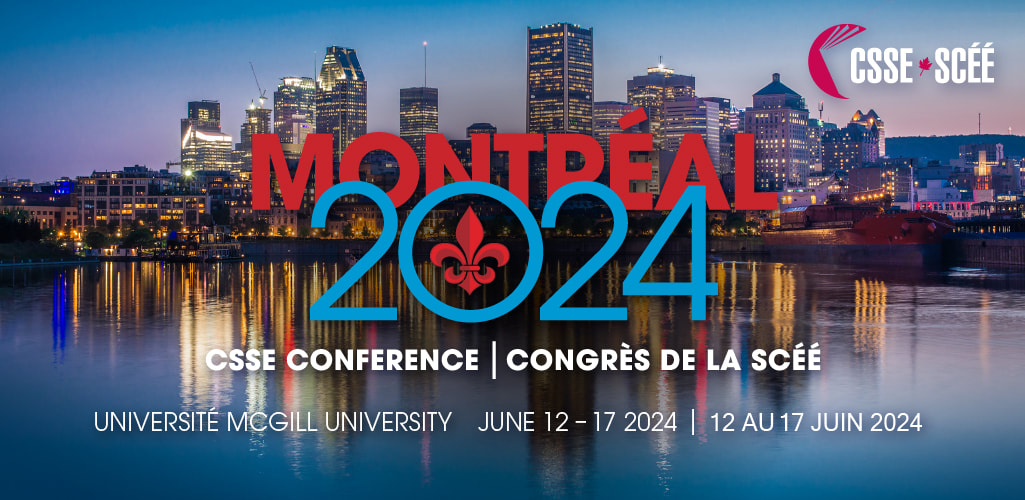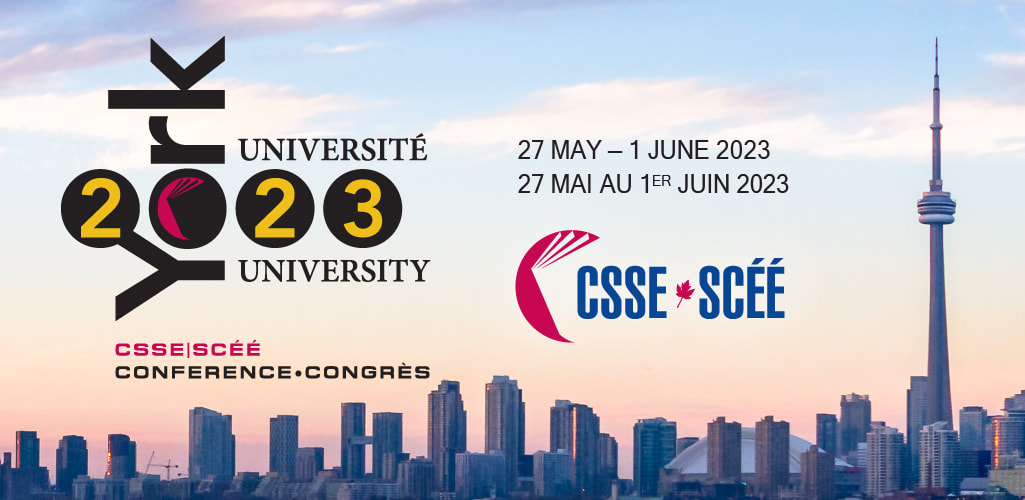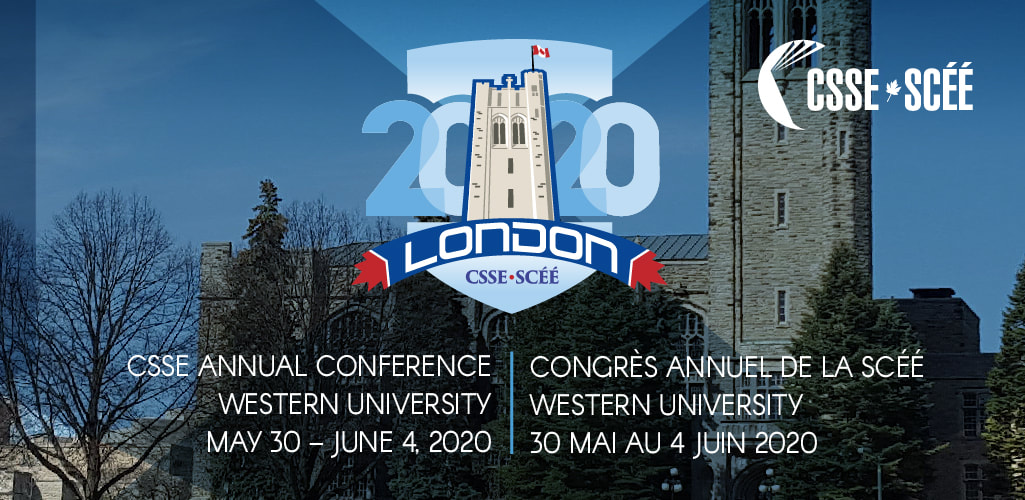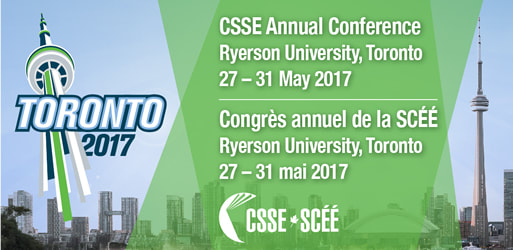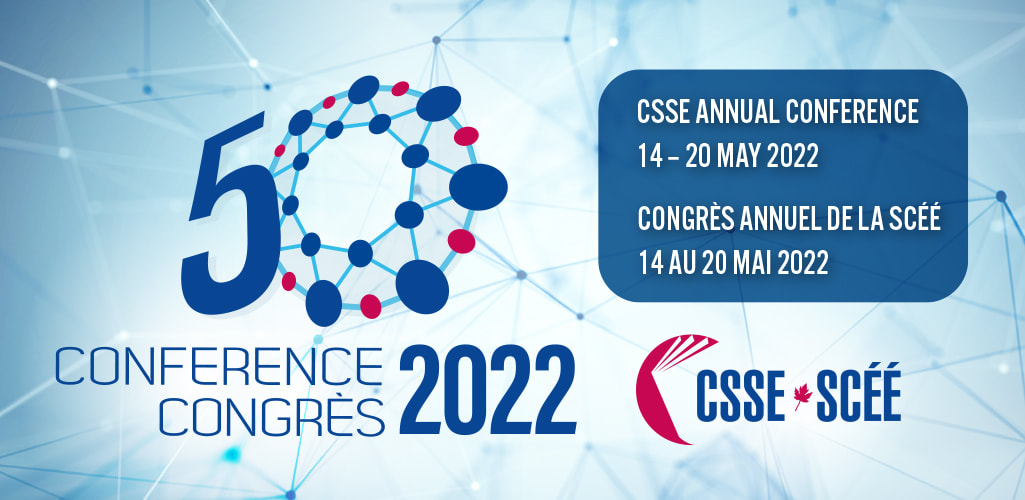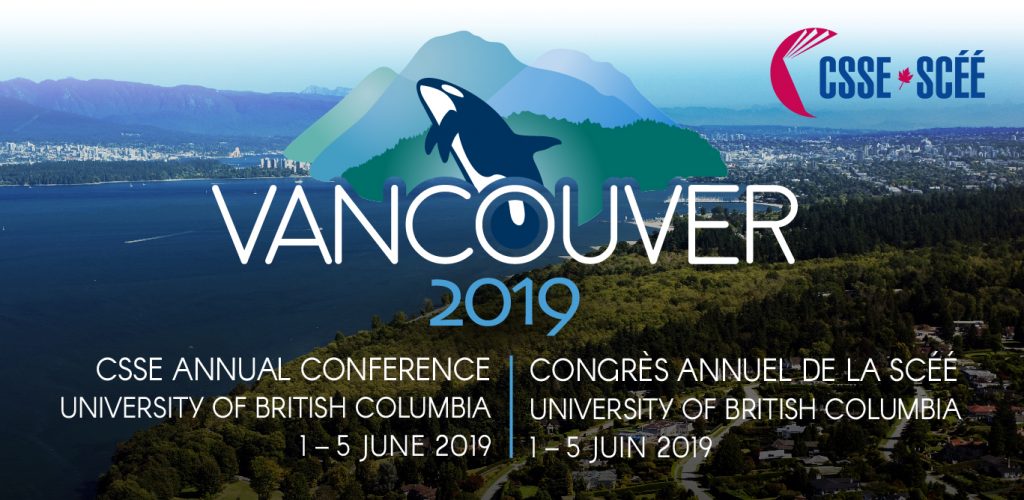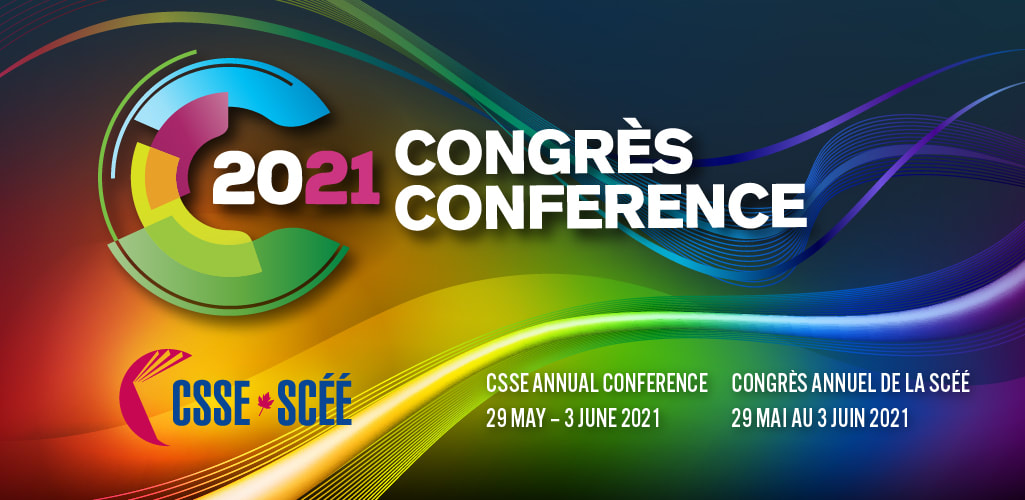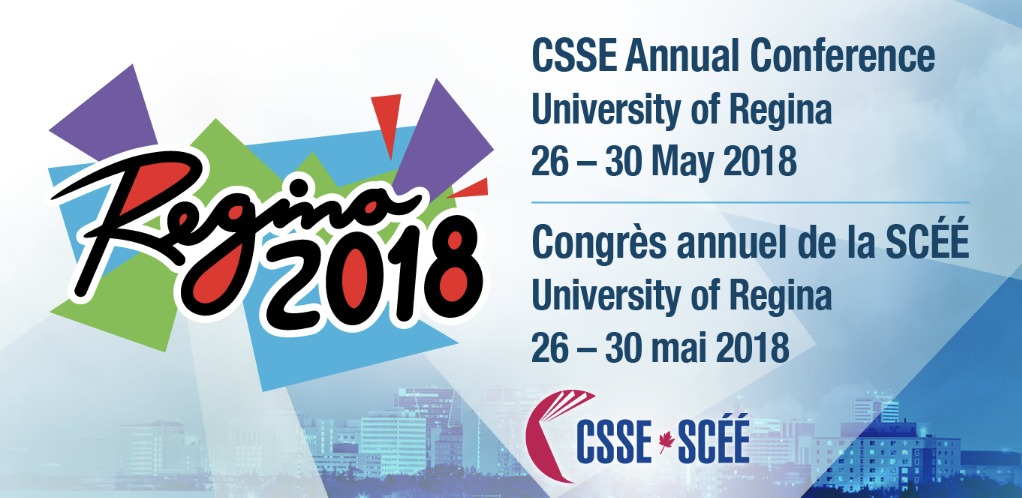About CSSE
The Canadian Society for the Study of Education (CSSE) annual conference is Canada’s largest gathering of researchers, scholars, graduate students, and practitioners in education. The mandate is to build connections among educational researchers and those in the field, including teachers, education assistants, school psychologists, school and school district administrators, and others. This dynamic four-day conference focuses on theory and praxis in every facet of education, including teacher education, educational psychology, curriculum studies, Indigenous education, women in education, educational foundations, educational research, and comparative & international education. Teachers, school psychologists, education assistants, principals, superintendents, and more are very welcome at the CSSE conference.
The CSSE Conference is part of the Congress of the Humanities and Social Sciences, which is Canada’s largest gathering of academics, and one of the largest in the world. Congress is the convergence of scholarly associations, each holding their annual conference under one umbrella at a Canadian university. Every year, for over 90 years, Congress has collaborated with a partner university, participating scholarly associations, and partners to bring you inspiring presentations, panels, workshops, and cultural events.
The CSSE Conference is part of the Congress of the Humanities and Social Sciences, which is Canada’s largest gathering of academics, and one of the largest in the world. Congress is the convergence of scholarly associations, each holding their annual conference under one umbrella at a Canadian university. Every year, for over 90 years, Congress has collaborated with a partner university, participating scholarly associations, and partners to bring you inspiring presentations, panels, workshops, and cultural events.
CSSE 2024
CSSE’s 52nd Annual Conference will be held from Wednesday, June 12 (preconference day) to Monday, June 17 (postconference day) as part of the Congress of the Humanities and Social Sciences. Congress 2024 will take place at McGill University in Montréal, Québec. Please see the official CSSE Call for Proposals for additional information.
CSSE features multiple session formats that are intended to reflect the diversity of research and scholarship in education. Submitters should select the format that best reflects the goals of their proposal (p. 4). Participatory and interactive sessions are encouraged, and some format examples are: Multi-paper sessions; symposia and panels; roundtables; and posters. CASIE Conference Program Chairs will make the final decision regarding the presentation format, and this will be communicated in their acceptance notification.
CSSE features multiple session formats that are intended to reflect the diversity of research and scholarship in education. Submitters should select the format that best reflects the goals of their proposal (p. 4). Participatory and interactive sessions are encouraged, and some format examples are: Multi-paper sessions; symposia and panels; roundtables; and posters. CASIE Conference Program Chairs will make the final decision regarding the presentation format, and this will be communicated in their acceptance notification.
CASIE Submissions
As part of CSSE, we invite you to submit your work to the Canadian Association for the Study of Indigenous Education (CASIE).
To do so, please follow the instructions outlined in CSSE's Call for Proposals and take special note that CASIE's submission criteria differ slightly from the standard CSSE criteria (p. 8). To align with our peer-review form, we ask that the 3-page summary includes:
To do so, please follow the instructions outlined in CSSE's Call for Proposals and take special note that CASIE's submission criteria differ slightly from the standard CSSE criteria (p. 8). To align with our peer-review form, we ask that the 3-page summary includes:
- Research Context
- Author(s) positionality, relationship to the field of Indigenous Education and connections to Indigenous communities.
- The proposal reflects research priorities of Indigenous communities or priorities identified by the community (including TRC and/or MMIWG2+ recommendations) and how this was determined.
- Note: Submissions should be de-identified, Nations and/or specific names of Elders, Knowledge Keepers, and Communities should be masked. Example: This work was guided by Elder [Name] from the [Local] Nation.
- Research Description
- A research question or clear focus
- A complete overview of what the author(s) did, how they did it, what they learned, and the implications of their learning which aligns with the research question or focus (theoretical framing, methodology/methods, findings/conclusions). Proposals with in-process or ongoing work will also be considered.
- Include information on how the research was validated or evaluated in cultural ways by the respective Indigenous communities and demonstrate respectful research practices as per the Tri-Council Policy Statement on Research Involving the First Nations, Inuit, and Métis Peoples of Canada. These practices may include references to reciprocity, Indigenous worldviews, benefits to Indigenous communities, interconnections between humans and the natural world, collaborative practices, and maintenance of cultures, languages, and identities as First Nations, Métis, and Inuit Peoples.
- Significance to the Field of Indigenous Education
- Demonstrates a contribution to the field of Indigenous Education (including decolonial and/or Indigenous theories, including TRC and/or MMIWG2+ recommendations).
- Demonstrates how the research will advance priorities of Indigenous communities or priorities identified by the communities.
Submitting a Proposal (Deadline: October 11, 2023)
- Log in to the CSSE Members’ Portal
- Renew (or purchase) your CSSE membership and CASIE membership. The person submitting each proposal must have a current CSSE and CASIE membership valid until the end of the conference. Presentations by an Indigenous community member alongside a CASIE member/researcher are encouraged.
- Upload your proposal and supporting details to the submission platform. Submitters will be directed to the submission platform from within the CSSE Members’ Portal. Proposals sent by any other means will not be accepted.
- The deadline for submissions is Wednesday, October 11, 2023
Registration Fees
Registration for CSSE and Congress will open in January. All delegates attending or presenting at CSSE are required to register and pay for both the CSSE Conference Registration Fee and the Congress Registration Fee. CSSE conference registration does not include CSSE membership. You can renew or submit your CSSE and CASIE memberships on the CSSE Member’s Portal.
Black & Indigenous Graduate Students and Community Participants
CSSE and Congress registration fees have been waived for Black and Indigenous graduate students and for Black and Indigenous invited community speakers. (p. 18/19)
Invited community speakers include any Black or Indigenous community participant who is not otherwise attending Congress or CSSE but is involved/invited as part of a presentation or session at the conference. Examples of invited community speakers include Elders, knowledge keepers, and community members supporting presentations at CSSE. (p. 19)
Invited community speakers include any Black or Indigenous community participant who is not otherwise attending Congress or CSSE but is involved/invited as part of a presentation or session at the conference. Examples of invited community speakers include Elders, knowledge keepers, and community members supporting presentations at CSSE. (p. 19)
Program Chairs
For questions and inquiries related to CASIE's program, please contact:
- Dr. Melanie Brice - [email protected]
- Dr. Jennifer - [email protected]
CSSE/CASIE Membership
Membership in CSSE has many benefits including an annual conference, professional networking, representation to several national groups with direct access to decision makers, and a subscription to the leading Canadian educational journal (CJE).
Current Rates for CSSE annual individual membership rates are:
In addition to the basic CSSE membership rate, members are required to join and pay the membership fee for at least one constituent association. Rates for constituent associations range from $10 to $39. The current cost to join CASIE is:
Click here to visit the CSSE Member Services website.
Current Rates for CSSE annual individual membership rates are:
- Regular: $120.00
- Student / Low Income: $50.00
- Retired: $60.00
- International: $72.00
In addition to the basic CSSE membership rate, members are required to join and pay the membership fee for at least one constituent association. Rates for constituent associations range from $10 to $39. The current cost to join CASIE is:
- Regular: $10.00
- Student / Low Income: $5.00
- Retired: $5.00
- International: $10.00
Click here to visit the CSSE Member Services website.
Past Conferences
CSSE/CASIE 2023 Call for Proposals
Deadline: October 1, 2022
Deadline: October 1, 2022
Deadline: Submissions are due by October 1, 2022.
Over the summer, CASIE Executive collaborated with interested association members to update the form used for peer review. The intention was to respond to author and reviewer requests to better align the review with research priorities and considerations in Indigenous Education. Authors are encouraged to review instructions outlined in the Call for Presentations (pp. 4-6), including the headings provided by CSSE. Submissions to CASIE will be peer reviewed based on the following criteria (different from p. 9 in the Call):
Researcher Context
The author(s) have included their relationship to the field of Indigenous Education and connections to Indigenous community/ies (if applicable); and The proposal reflects research priorities of Indigenous communities or priorities identified by the community (including TRC and/or MMIWG2+recommendations) and how this was determined [*As submissions are de-identified, Nations and/or specific names of Elders, Knowledge Keepers, Communities should be masked.] Example: This work was guided by Elder [Name] from the [Local] Nation.
Research Description
Includes a research question or clear focus; Includes a complete overview on what the author(s) did, how they did it, what they learned, and implications of their learning which aligns with the research question or focus. [*Proposals with in-process or ongoing work will also be considered]; Includes information on how the research was evaluated in cultural ways (if applicable); and Demonstrates respectful research practices as per Tri-Council Policy Statement on Research Involving the First Nations, Métis, Inuit Peoples of Canada. These practices may include references to reciprocity; Indigenous worldviews; benefits to Indigenous communities; interconnections between humans and the natural world; collaborative practices; maintenance of cultures, languages, and identities as First Nations, Métis, and Inuit Peoples.
Clarity & Comprehensiveness
Includes sufficient description to understand the research; Addresses the research question or develops the stated focus; and Connects to previous literature and/or related work in the field. Contribution to the Field of Indigenous Education Demonstrates a contribution to the field of Indigenous Education (including decolonial and/or Indigenous theories). Demonstrates how the research will advance priorities of Indigenous communities or priorities identified by the community (including TRC and/or MMIWG2+ recommendations).
We will be hosting two virtual sessions to support members with the submission process. All are welcome and please encourage any graduate students and/or community members who might be interested in submitting their work to CASIE and new to the process to attend! These sessions will be held at the following times:
Thursday, September 8th: 16:00 (Atlantic)/15:00 (Eastern)/13:00 (Mountain)/12:00 (Pacific) Monday, September 26th: 16:00 (Atlantic)/15:00 (Eastern)/13:00 (Mountain)/12:00 (Pacific) https://uregina-ca.zoom.us/j/99725519186?pwd=UHg2QW1tTXdzYmtJM1hGZ0poSTVWZz09
Meeting ID: 997 2551 9186
Passcode: 492566
Over the summer, CASIE Executive collaborated with interested association members to update the form used for peer review. The intention was to respond to author and reviewer requests to better align the review with research priorities and considerations in Indigenous Education. Authors are encouraged to review instructions outlined in the Call for Presentations (pp. 4-6), including the headings provided by CSSE. Submissions to CASIE will be peer reviewed based on the following criteria (different from p. 9 in the Call):
Researcher Context
The author(s) have included their relationship to the field of Indigenous Education and connections to Indigenous community/ies (if applicable); and The proposal reflects research priorities of Indigenous communities or priorities identified by the community (including TRC and/or MMIWG2+recommendations) and how this was determined [*As submissions are de-identified, Nations and/or specific names of Elders, Knowledge Keepers, Communities should be masked.] Example: This work was guided by Elder [Name] from the [Local] Nation.
Research Description
Includes a research question or clear focus; Includes a complete overview on what the author(s) did, how they did it, what they learned, and implications of their learning which aligns with the research question or focus. [*Proposals with in-process or ongoing work will also be considered]; Includes information on how the research was evaluated in cultural ways (if applicable); and Demonstrates respectful research practices as per Tri-Council Policy Statement on Research Involving the First Nations, Métis, Inuit Peoples of Canada. These practices may include references to reciprocity; Indigenous worldviews; benefits to Indigenous communities; interconnections between humans and the natural world; collaborative practices; maintenance of cultures, languages, and identities as First Nations, Métis, and Inuit Peoples.
Clarity & Comprehensiveness
Includes sufficient description to understand the research; Addresses the research question or develops the stated focus; and Connects to previous literature and/or related work in the field. Contribution to the Field of Indigenous Education Demonstrates a contribution to the field of Indigenous Education (including decolonial and/or Indigenous theories). Demonstrates how the research will advance priorities of Indigenous communities or priorities identified by the community (including TRC and/or MMIWG2+ recommendations).
We will be hosting two virtual sessions to support members with the submission process. All are welcome and please encourage any graduate students and/or community members who might be interested in submitting their work to CASIE and new to the process to attend! These sessions will be held at the following times:
Thursday, September 8th: 16:00 (Atlantic)/15:00 (Eastern)/13:00 (Mountain)/12:00 (Pacific) Monday, September 26th: 16:00 (Atlantic)/15:00 (Eastern)/13:00 (Mountain)/12:00 (Pacific) https://uregina-ca.zoom.us/j/99725519186?pwd=UHg2QW1tTXdzYmtJM1hGZ0poSTVWZz09
Meeting ID: 997 2551 9186
Passcode: 492566
